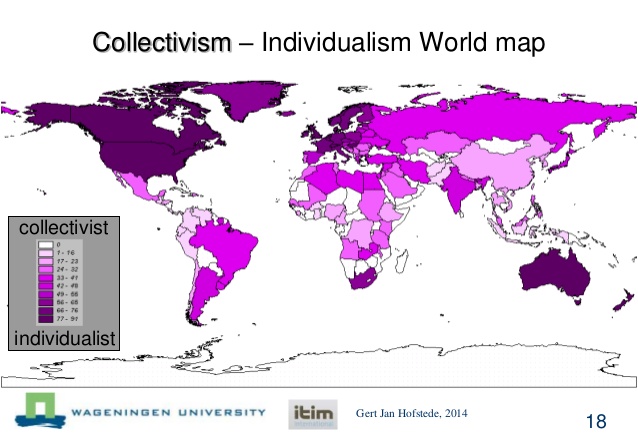By KYLE HEGARTY
(Editor’s note: The Globalists is part of Dispatches’ Tech Tuesday series covering technology and global management in Europe and Asia.)
Are you a moron or is your extended family a bunch of idiots? It turns out insults can tell a lot about where people come from.
Believe it or not, global insult patterns can also be applied towards strengthening multi-national teams and even deciding what to sell and where to sell it.
Really.
The cultural dimension of insults
In what must have been one of the most entertaining research projects ever, researchers in Italy studied insults across different cultures.
In their home country, for example, they noticed people in the south insulted each other differently than in the central part of the country and in the north. The results closely fit into a “cultural dimension” called Individualism/Collectivism. And understanding this “cultural dimension” can improve how global businesses operate.
Finally, the complicated cross-cultural psychology studies were getting interesting. Learn insults from around the world and improve my cultural IQ? Sign me up.
 Individualism/Collectivism is one of the most researched cultural dimensions and there’s a LOT of material out there.
Individualism/Collectivism is one of the most researched cultural dimensions and there’s a LOT of material out there.
Want to draw a connection between ancient rice-farming and modern education styles? Check out this dimension.
Want to map life insurance purchasing trends around the world? Or how different consumers are influenced to make purchases? What about building a dating app?
It’s a dimension that can help anyone in international advertising, marketing and sales or who leads multi-cultural teams. There’s a lot here, including juicy insult trends.
Individualistic societies tend to place a greater emphasis on, you guessed it, the individual rather than the larger group.
 Collectivist societies tend to emphasize the significance of the group over the individual. Take a look at this map showing countries based on their individualistic tendencies. Where are you from and do you agree?
Collectivist societies tend to emphasize the significance of the group over the individual. Take a look at this map showing countries based on their individualistic tendencies. Where are you from and do you agree?
What’s the first insult that comes to mind? Is it focused on an individual or based on relationships with more than one person?
Getting personal
By analyzing popular insults around the world, countries scoring higher on Individualism used common words geared towards specific people. “Moron,” “idiot,” “f%^& you!”
You get the picture.
However, the collectivist countries had insults focused on groups, often family members. The more collectivist, the more family members are involved.
Multiple generations of ancestry get pulled into the mix resulting in nightmare-inducing images. Eggs appear in a lot of Chinese insults, for example, and imply being the offspring of animals.
Check out this amusing – and completely not work-appropriate – video of Americans trying to learn insults from around the world.
Consider this: Individualistic cultures tend towards being task-focused, whereas in Collectivist cultures the focus prioritizes relationships. In a business environment, someone who is rigidly focused on staying on point may be acting inappropriately if it’s being done without consideration of the situation and people involved.
On the insult front, telling someone to ‘go f&*k themselves’ is a task-focused insult, isn’t it? Compare this to a more complicated insult involving animals and ancestors.
Task-related, yes, but with a lot more family involvement. In a way, it’s all relative.
How this translates into business
Variances in individualistic versus collectivist mindsets can be a very big deal. These differences in thinking affect how people view problem-solving, human rights and identities, among many others.
Individualism/collectivism effects can be seen everywhere in the workplace. How does an organization hire, train and mentor employees?
Do they incentivize groups or individuals?
How does this affect negotiation?
Western companies continue expanding into Asia. Who do they send over? Usually someone who scores high on the Individualism scale. Why? Because they want someone who’s task-oriented, direct and who can work independently.
But look again at the map above. Asia is a huge region with thousands of years of varying collectivist cultures.
When viewed through this cultural dimension, these conflicts and mistakes can be explained and predicted. They can also be minimized, and with practice, avoided.
The first step is to know your cultural dimensions. In other words, don’t be an idiot or a dumb egg.
So there you have it. A politically incorrect way to think about Individualism/Collectivism.
One more thing: Here’s a controversial team-building activity: if you work with people from around the world, see if this correlation between insults and collectivist/individualist countries is true.
It will make your next team dinner much more colorful.
About the author:
Kyle Hegarty is managing director, Asia Pacific, for TSL Marketing, a global integrated marketing firm.
Kyle helps companies develop and expand their footprints in Asia Pacific markets specifically by focusing on cross-cultural leadership strategies and sales and marketing solutions to drive growth.
He provides teams with the Sandler Sales training methodology.
Clients include: Akamai, Oracle, IBM, Fuji Xerox, Trade Gecko, Hay Group, Bazaar Voice, Google, Amazon Web Services, Avaya, Genpact & Sungard.
You can see Kyle’s full LinkedIn bio here.
You can see more The Globalists international management posts here:
• Here are my 5 tips for successfully managing a global team – Kyle Hegarty
• Where is your country on the process-outcome continuum? – Darin Williams
• Asoh Defense – ‘Companies must empower leaders to hold themselves accountable’ – Albrecht Stahmer
• ‘The Culture Map’: Don’t fight the differences, global managers … leverage them – Albrecht Stahmer
• ‘I can’t make your employees more entrepreneurial … only you can’ – Albrecht Stahmer














